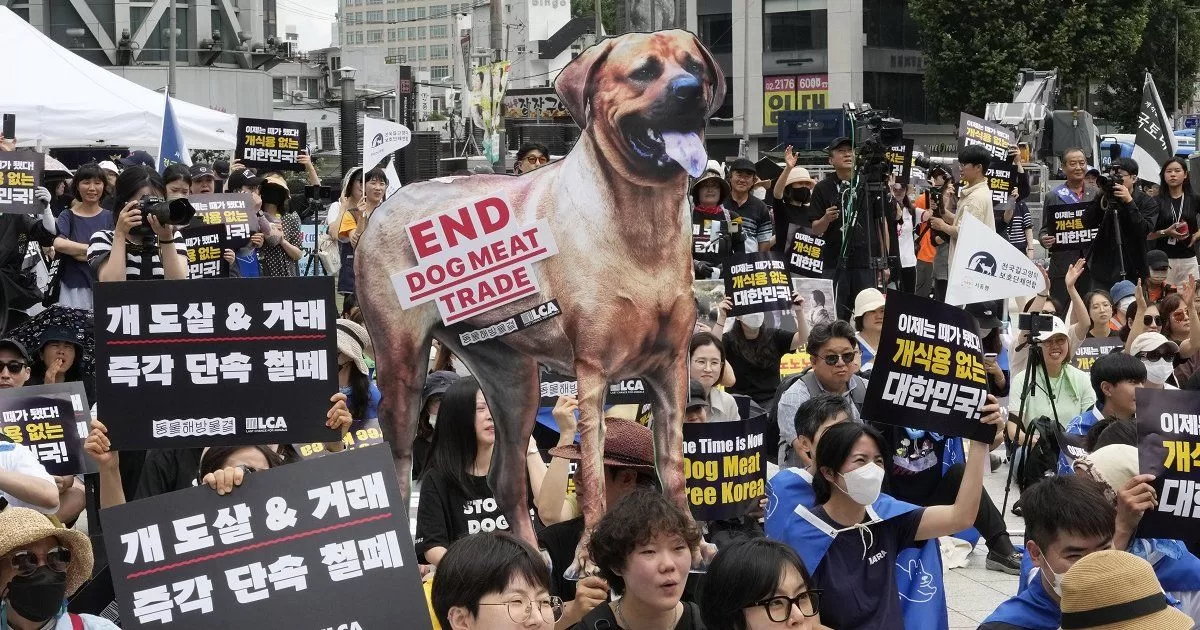SEOUL.- The parliament of South Korea approved landmark legislation Tuesday banning the production and sale of dog meat after growing calls for its veto amid concerns about animal rights and for the international image of the nation.
Some angry dog breeders said they will challenge the constitutionality of the rule and call for protests, indicating that the heated debate over the ban will continue.
The bill will make it illegal to slaughter, breed, trade and sell dog meat for human consumption from 2027, and will punish these acts with sentences of between two and three years in prison. But the text does not stipulate sanctions for the consumption of dog meat.
The consumption of dog meat, a centuries-old practice on the Korean Peninsula, is not explicitly prohibited or illegal in South Korea. Recent surveys showed that the majority of South Koreans no longer eat this type of meat, but also indicate that one in three oppose the ban even though they do not consume it.
The National Assembly approved the initiative on Tuesday by 208 votes in favor and none against. The government of President Yoon Suk Yeol supports the veto, so the following steps for the entry into force of the rule are considered mere formalities.
“This law is designed to contribute to making the values of animal rights a reality, pursuing respect for life and harmonious coexistence between humans and animals,” indicates the text of the norm.
The law will offer aid to breeders and other professionals in the sector to close their businesses or look for alternatives. Details on making the industry illegal will be worked out by officials, breeders, experts and animal rights activists, according to the bill.
Humane Society International called the passage of the legislation “historic.”
“I never thought I would see a ban on the cruel dog meat industry in my lifetime. South Koreabut this historic victory for animals is proof of the passion and determination of our animal protection movement,” said JungAh Chae, executive director of the group’s country office.
The approval of the new legislation upset breeders.
“It is clear state violence since it attacks freedom of professional occupation. We cannot sit idly by,” said Son Won Hak, a farmer and leader of a sector association.
Son indicated that the breeders will present a petition before the Constitutional Court and they will organize demonstrations. They will meet on Wednesday to discuss further measures, he added.
There is no reliable data on the exact size of the dog meat industry in South Korea. Activists and breeders said hundreds of thousands of dogs are slaughtered each year in the country for their meat.
The campaign against dog meat received a significant boost from the country’s first lady, Kim Keon Hee, who has expressed her support for the veto on several occasions. This has made it the subject of scathing criticism and serious insults during the breeders’ protests.
The legislation does not specify how dog breeders and other professionals in the sector will be helped after the measure comes into force, which could lead to continued hostilities, according to observers.
“Dogs are different from cows, chickens and pigs,” said Kim Myung-ae, a 58-year-old Seoul resident. “Why continue eating dogs when they are now seen more as family pets than food?”
Another resident in the South Korean capital, Jeong Yoon Hee, disagreed, saying that eating dog meat is a matter of personal choice and food culture. “Dogs are dogs, not humans,” he added.
Source: With information from AP



